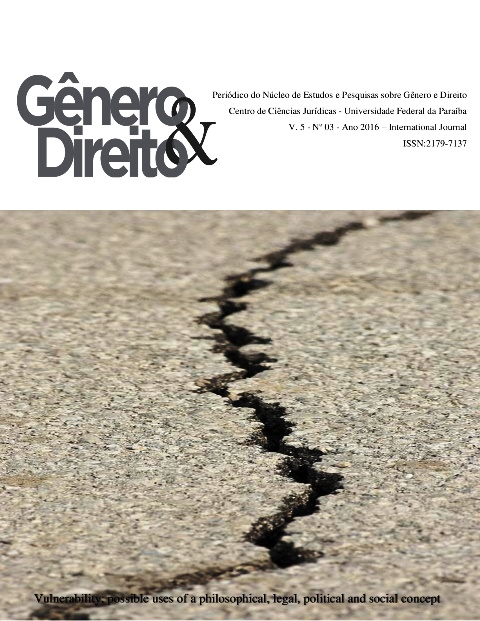VULNERABILITY AND THE (DISABILITY) LAW: STATUS, CHALLENGES AND PROMISES OF A CONTROVERSIAL CATEGORY
Palavras-chave:
vulnerability – legal capacity – UNCRPD – persons with disabilities – guardianshipResumo
Despite the increasing confidence in the transformative potential of the concept of “vulnerability”, its juridical use is still susceptible of producing some exclusionary consequences: the interchangeable use of terms “vulnerable”, “weak” and “fragile” referred to groups whose members are intended to need a special protection, is likely to have a “labelling-effect” on those who take part to some specific groups, reinforcing their distance from the paradigmatic subject of law. After addressing the current use of the category at stake, the Author will analyse the Convention on the Rights of Persons with Disabilities (UNCPRD), which constitutes a break with the liberal tradition and implements a universal (therefore, non-exclusionary) notion of vulnerability. Particular attention will be paid to the new conception of legal capacity welcomed by art. 12 UNCRPD.Downloads
Referências
Azzena, Luisa (2006), “Divieto di discriminazione e posizione dei soggetti ‘deboli’. Spunti per una teoria della ‘debolezza’”, in Calvieri (ed.), Divieto di discriminazione e giurisprudenza costituzionale. Torino: Giappichelli: 35-86.
Bach, Michael (2006), Legal Capacity, Personhood, and Supported Decision Making. Canadian Association of Community Living.
Bach, Michael and Kerzner, Lana (2010), A New Paradigm for Protecting Autonomy and the Right to Legal Capacity. Advancing Substantive Equality for Persons with Disabilities through Law. Ontario: Policy and Practice.
Bergoffen, Debra B. (2012), Contesting the Politics of Genocidal Rape: Affirming the Dignity of Vulnerable Body. New York: Routledge.
Bernardini, Maria Giulia and Giolo, Orsetta (2014), “Il ‘parametro mobile’. Note sul rapporto tra eguaglianza e differenza”, Filosofia Politica, 27, 3: 505-520.
Bobbio, Norberto (1990), L’età dei diritti. Torino: Einaudi.
Butler, Judith (2004), Precarious Life: The Powers of Mourning and Violence. London: Verso.
Cavarero, Adriana (2013), Inclinazioni. Critica della rettitudine. Milano: Cortina.
Cendon, Paolo (2008), “Soggetti forti, soggetti deboli”, Minorigiustizia, 4: 193-201.
Devi, Nadine (2013), “Supported Decision-Making and Personal Autonomy for Persons with Intellectual Disabilities: Article 12 of the UN Convention on the Rights of Persons with Disabilities”, Journal of Law, Medicine & Ethics, 41: 792-806.
Dinerstein, Robert (2012), “Implementing Legal Capacity under Article 12 of the UN Convention on the Rights of Persons with Disabilities: the Difficult Road from Guardianship to Supported Decision-Making”, Human Rights Brief, 19, 2: 8-12.
Fanlo Cortés, Isabel (2008), Bambini e diritti. Una relazione problematica. Torino: Giappichelli.
Federazione Italiana Superamento Handicap – Fish – (2016), Proposta di II Programma d’azione biennale per la promozione dei diritti e l’integrazione delle persone con disabilità, Firenze (on line document).
Ferrajoli, Luigi (2007), Principia Iuris. Teoria del diritto e della democrazia. 1. Teoria del diritto. Roma-Bari: Laterza.
Fineman, Martha A. (2008-9), “The Vulnerable Subject: Anchoring Equality in the Human Condition”, Yale Journal of Law and Feminism, 20: 1-23.
Fineman, Martha A. and Grear, Anna (eds.) (2013), Vulnerability. Reflections on a New Ethical Foundation for Law and Politics. Aldershot: Ashgate.
Flynn, Eilionor and Arstein-Kerslake, Anna (2014), “Legislating Personhood: Realising the Right to Support in Exercising Legal Capacity”, International Journal of Law in Context, 10, 1: 81-104.
Francis, Leslie P. and Silvers, Anita (2007), “Liberalism and Individually Scripted Ideas of the Good: Meeting the Challenges of Dependent Agency”, Social Theory and Practice, 33, 2: 311-334.
Gianformaggio, Letizia (2005), Eguaglianza, donne e diritto. Bologna: il Mulino.
Gilson, Erinn C. (2014), The Ethics of Vulnerability. A Feminist Analysis of Social Life and Practice. New York: Routledge.
Goodin, Robert E. (1985), Protecting the Vulnerable. A Reanalysis of our Social Responsibilities. Chicago: University of Chicago Press.
Guaraldo, Olivia (2012), Comunità e vulnerabilità. Per una critica politica della violenza. Pisa: Ets.
Jaworska, Agnieszka (2009), Advance Directives and Substitute Decision-Making, in Zalta (ed.), The Stanford Encyclopedia of Philosophy (on line journal).
Kittay, Eva F. (1999), Love’s Labor: Essays on Women, Equality and Dependency. New York: Routledge.
Kittay, Eva F. (2011), “Forever Small: The Strange Case of Ashley X”, Hypatia, 26, 3: 610-631.
Mackenzie, Catriona and Stoljar, Natalie (eds.) (2000), Relational Autonomy: Feminist Perspectives on Autonomy, Agency and the Social Self. New York: Oxford University Press.
Mackenzie, Catriona et al. (eds.) (2014), Vulnerability. New Essays in Ethics and Feminist Philosophy. New York: Oxford University Press.
MacKinnon, Catharine (1983), “Feminism, Marxism, Method, and the State: Toward Feminist Jurisprudence”, Signs, 8, 4: 635-658.
Mazzoni, Cosimo M. (2013), Psiche o la forma del corpo. Milano: Giuffrè.
Murphy, Ann V. (2011), “Corporeal Vulnerability and the New Humanism”, Hypatia, 26, 3:, 575-590.
Otto, Dianne (2006), “Lost in Translation: Re-Scripting the Sexed Subjects of International Human Rights Law”, in Orford (ed.), International Law and Its Others. Cambridge: Cambridge University Press: 318-356.
Peroni, Lourdes and Timmer, Alexandra (2013), “Vulnerable Groups: the Promise of an Emerging Concept in European Human Rights Convention Law”, International Journal of Constitutional Law, 11, 4: 1056-1085.
Quinn, Gerard and Degener, Theresia (2002), Human Rights and Disability: the Current Use and Future Potential of United Nations Human Rights Instruments in the Context of Disability. Geneva: Office of the High Commission for Human Rights.
Quinn, Gerard (2010), Personhood & Legal Capacity: Perspectives on the Paradigm Shift of Article 12 CRPD. Paper presented to the Conference on Disability and Legal Capacity under the CRPD, Harvard Law School, Boston.
Stanzione, Paolo (1999), “Personalità, capacità e situazioni giuridiche del minore”, Il diritto della famiglia e delle persone, 37, 1: 260-270.
Stanzione, Paolo (2009), “Costituzione, diritto civile e soggetti deboli”, Famiglia e diritto, 3: 305-314.
Timmer, Alexandra (2013), “A Quiet Revolution: Vulnerability in the European Court of Human Rights”, in Fineman and Grear (eds.) (2013), Vulnerability. Reflections on a New Ethical Foundation for Law and Politics. Aldershot: Ashgate: 147-170.
Vandehole, Wouter and Ryngaert, Julie (2012), “Mainstreaming Children’s Rights in Migration Litigation: ECtHR, Muskhadzhiyeva and others v. Belgium, 19 January 2010”, in Brems (ed.). Diversity and European Human Rights: Rewriting Judgements of the ECHR. Cambridge: Cambridge University Press: 68-92.

